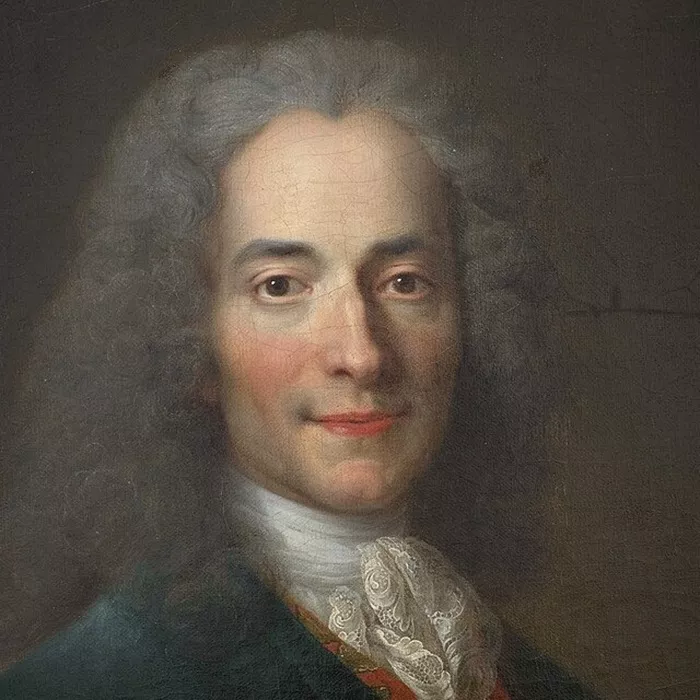
Voltaire (1694–1778), a leading figure of the Enlightenment, was a French writer, philosopher, and poet celebrated for his wit, advocacy for freedom of thought, and critique of religious dogma. His works, spanning poetry, plays, and essays, embody his commitment to reason and justice, leaving an enduring legacy as a champion of intellectual freedom and literary brilliance.
Voltaire Biography
Born François-Marie Arouet on November 21, 1694, in Paris, Voltaire was the youngest of five children in a bourgeois family. His mother died when he was seven, leaving his upbringing largely in the hands of his father and an enlightened godfather. Showing an early talent for writing, he was educated at the Jesuit Collège Louis-le-Grand, where he honed his skills in literature and rhetoric.
Voltaire began his career as a writer under his birth name but adopted the pen name “Voltaire” in 1718 after imprisonment in the Bastille. His satirical wit, which often targeted powerful figures and institutions, made him both a celebrated figure and a controversial one. Early works, including his play Oedipus (1718), gained critical acclaim, marking the beginning of his ascent in literary and intellectual circles.
Throughout his life, Voltaire was an ardent advocate for freedom of expression, often clashing with authorities. His sharp criticism of the French monarchy and Catholic Church led to exile in England in 1726. There, he encountered the works of philosophers such as Locke and Newton, which deeply influenced his ideas on government, science, and individual liberty.
Returning to France, Voltaire wrote extensively, producing some of his most famous works, including the satirical novella Candide (1759), a biting critique of blind optimism and philosophical determinism. He also engaged in intellectual debates with contemporaries like Rousseau and Diderot, solidifying his place as a central figure of the Enlightenment.
Voltaire’s later years were marked by significant contributions to social reform. He used his influence to champion causes such as judicial fairness and religious tolerance, most famously defending Jean Calas, a Protestant falsely accused of murdering his son. This advocacy earned him admiration but also further enmity from his detractors.
Voltaire spent his final years in Ferney, near the French-Swiss border, where he continued writing prolifically. He died on May 30, 1778, in Paris, leaving behind a body of work that shaped modern thinking on reason, liberty, and justice.
Voltaire Poems
Though better known for his prose and philosophical writings, Voltaire’s poetry reflects his wit, intellect, and critique of society. Here are some notableexamples:
1. “The Henriade” (1723)
An epic poem in ten cantos celebrating King Henry IV of France,The Henriade embodies Voltaire’s admiration for enlightened monarchs and religious tolerance. The poem’s vivid imagery and political commentary highlight his dual role as a pocet and social reformer
2. “Poem on the Lisbon Disaster” (1756)
Written in response to the Lisbon earthquake of 1755, this philosophical poem questions the idea of divine providence and the optimism of thinkers like Leibniz. It captures Voltaire’s ability to blend emotion with intellectual critique.
3. “On the Death of Adrienne Lecouvreur” (1730)
A poignant ode to the actress Adrienne Lecouvreur, this poem mopurns her untimely death and critiques the societal prejudices that excluded actors from Christian burial rites.
4. “Epistle to Urania” (1732)
A satirical work addressing religious dogma, this poem shoswcases Voltaire’s mastery of irony and his commitment to free thought.
5. Various Short Epistles and Quatrains
Voltaire’s shorter poetic works often addressed personal themes or satirical subjects. His ability to distill complex ideas into concise verses demonstrates his poetic versatility.
Voltaire Quotes
1. “I disapprove of what you say, but I will defend to the deatth your right to say it.
2. “Judge a man by his questions rather than his answers.”
3.”Commonseiseisnotsocommon.”
4. “The best is the enemy of the good.”
5. “Faith consists in believing when it is beyond the power ofreason to believe.
6. “Every man is guilty of all the good he did not do.”
7. “It is dangerous to be right in matters on which the established aauthorities are wrong.
8. “Prejudices are what fools use for reason.”
9. “The more I read, the more I acquire, the more certain I am that Iknow nothing.”
10. “Man is free at the moment he wishes to be.”
Voltaire Facts
1. Voltaire’s pen name may derive from anagram of “AROVETLI,” a Latinized version of his surname.
2. He was imprisoned in the Bastille for 11 months due toa satirical poem targeting the regent of France.
3. His exile to England introduced him to the works of Johin Locke and Isaac Newton, shaping his Enlightenment ideals.
4. Voltaire amassed considerable wealth through strategicinvestments, including in the French lottery.
5. He corresponded with Catherine the Great of Russia and influenced her policies.
6. Voltaire kept a library of over 6,000 books at his home in Fernhey.
7. He once said he wanted to “live 80 years and never die,” reflecting his zest for life
8. Candide was banned in multiple countries for its satirical conttent
9. He wrote over 20,000 letters, making him one of the most prolific correspondents of his time.
10. Voltaire’s remains were moved to the Pantheon in Paris in1791, a testament to his lasting impact on French culture.
